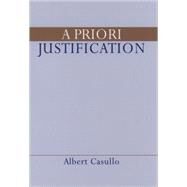A Priori Justification
, by Casullo, Albert- ISBN: 9780195115055 | 0195115058
- Cover: Hardcover
- Copyright: 3/13/2003
The major divide in contemporary epistemology is between those who embraceand those who reject the a priori-knowledge that is independent of experience.The importance of this issue, however, extends beyond the boundaries ofepistemology to include virtually every other area of philosophy. To a largeextent, a philosopher's position on the a priori determines how he or she goesabout answering other philosophical questions. Proponents of the a priorifrequently allege that rejecting the a priori is tantamount to rejectingphilosophy as a respectable intellectual discipline. Opponents respond that nointellectually respectable theory of knowledge can accommodate the a priori.Casullo's goal here is to provide a systematic treatment of the primaryepistemological issues associated with the a priori, which is also sensitive torecent developments in the field. He points out that assessing the status of thea priori within contemporary epistemology requires distinguishing therequirements of the a priori from traditional assumptions about the nature ofknowledge and justification. In freeing the a priori from these assumptions, hegenerates three major insights: First, the concept of a priori justification isminimal: it is simply the concept of non-experiential justification. Second, thebasic question that must be addressed is whether there are non-experientialsources of justified beliefs. Third, and most importantly, articulating theconcept of non-experiential justification and establishing that there arenon-experiential sources of justified belief requires empirical investigation.Casullo argues that epistemologists should recognize the role that empiricalevidence plays in resolving these fundamental issues. He concludes by proposingthat traditional approaches to the a priori, which focus primarily on theconcepts of necessity and analyticity, are misguided and essentially limited.Compelling and original, A Priori Justification should generate a reassessmentof these fundamental questions among scholars interested in the theory ofknowledge.







